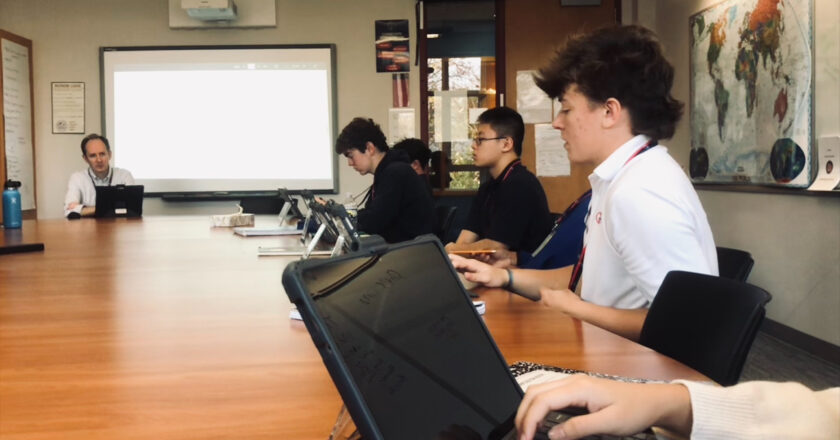The morning of November 6th, the day after the election, was a morning with perfect weather. It felt… wrong for it to be such a nice day. Donald Trump was going to be the next president of the United States, and everyone in the country knew it. Some celebrated it – my next-door neighbors put up red, white, and blue balloons next to their Trump sign, much to my annoyance – and others already took down their Harris signs, grimly trying to accept defeat. To me, the world feels different now – uncertain.
The anticipation of the election had been a pounding crescendo, a loud noise drowning everything else out. I was tired of hearing political ads over and over until I could practically memorize them verbatim, of that ever-present worry in my body over who’d win Nov. 5, 2024. But now that the election had been decided, I found myself feeling even more uneasy. All of us at Germantown Academy knew what happened, and whether we liked it or not, it affected our lives. The election decision was in the air and we had to keep inhaling.
I knew some of my peers shared my own sour emotions, while others would be chattering excitedly amongst themselves as the people in my boat eavesdropped quietly. I didn’t know if the students who’d been rooting for Donald Trump to win would enthusiastically boast, like that Wednesday was their version of Christmas morning. I also wasn’t completely sure if the students who’d been rooting for Kamala Harris to win would cry, or look down at their feet, or maybe not even show up to school.
However, I had an intuition that those unhappy ones wouldn’t betray any visible emotion. They’d been told the same thing I had – “Everything will be okay.” They also knew that if they displayed any unwarranted negativity, people were going to make assumptions about who they supported – because it’s politics. People always want to know what side you’re on. I know I do.
Political views can make or break relationships, and that’s part of what made the election such a dire matter. Elections have the power to turn a relationship of mutual respect into one of bitter resentment. That’s why speaking up about your feelings, like we’re preached to do in school, seems impossible – especially when the audience is your friends and classmates. Saying anything political in such a heated time feels like a risk with an unreliable success rate.
When this fear of being judged takes hold, lines form between groups. Suddenly, you’re only comfortable speaking to the same people – the people that you suspect agree with you. It’s a phenomenon that I’d become aware of at Germantown Academy in the days leading up to the election and much more noticeably afterward. I heard no discourse between students, no disagreements or debate – only hushed murmurs of sullen-faced kids echoing the same thing or tables of fanboys high-fiving and loudly voicing their agreement. These divided groups of students never intersected, never dared bring up politics amongst each other – why would they? Who wants to go out of their way to find a difficult middle ground with someone’s contradicting opinion when we’re all so convinced what we think is right?
And that’s why there is no easy solution to post-election polarization amongst students because few are willing to have uncomfortable conversations where their view is challenged. We, as a student body and as a people, are largely more content to simply abide by our personal codes, flawed or not, and convince ourselves that what we think is fact. As people, we’re not wrong or bad for enabling this – affirmation feels good. Why talk to someone with an opposing view if there’s nothing in it for you but discomfort?
This discomfort is the solution to polarization. That moment where you’re going to do something, but you really don’t want to, but you do anyway – that moment is what defines who you are as a person. I encourage you to step outside of your comfort zone and have a conversation with someone who you aren’t already positive agrees with you. Despite the possible distress it may cause you to hear their opinion, listen to it and regard it as something equally valid, as you’d want someone to treat your own beliefs. By doing this, compromise is not a distant venture but a tangible possibility.We’re all so used to our Germantown Academy bubble that it’s hard to think about what’s beyond it. In our smaller, curated space, it’s easy to cling to what’s easy– people who like what you like, who share things in common with you, who rant with you and laugh at your jokes. But the differences between people in our community, the diversity of thought and opinion, is also what makes it special. Would you want to go to school in a place where everyone is the same? You think you might, but you’d soon realize it’s pretty boring. If we don’t talk to people who disagree with us, how can we test our point of view? If we’re never challenged, how can we grow?

